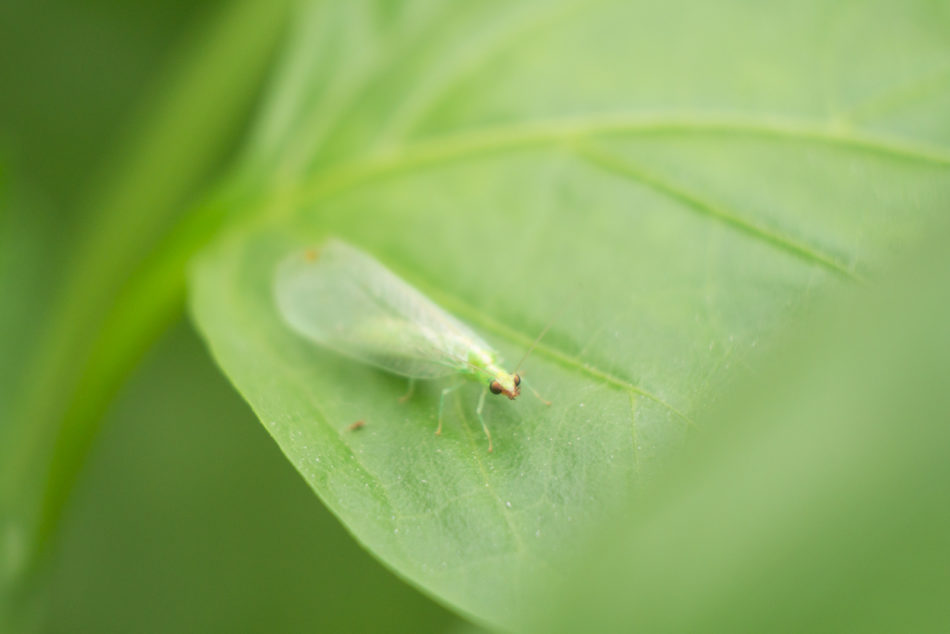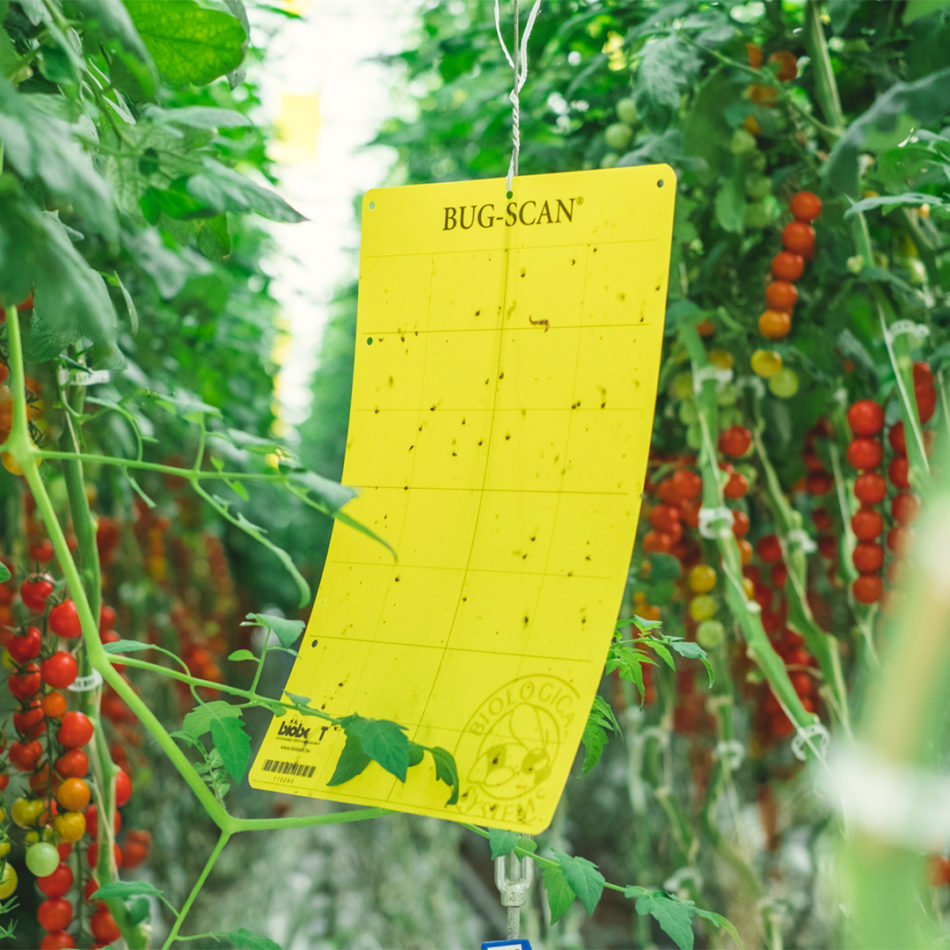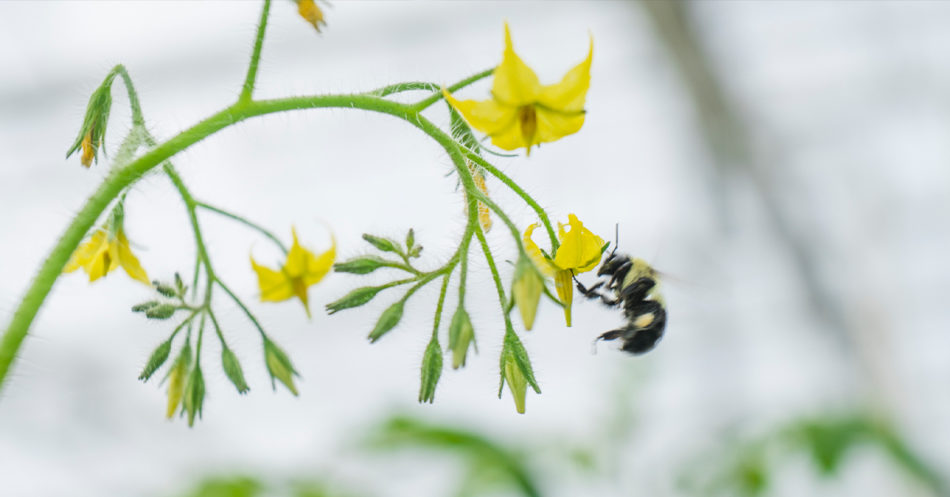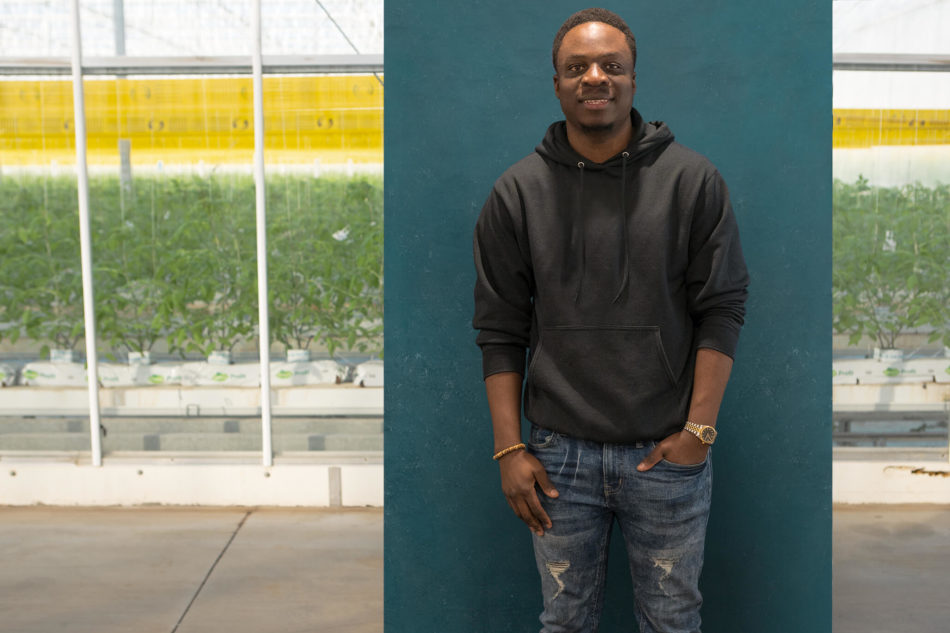What is IPM?
Integrated Pest Management (IPM) is a multifaceted pest management strategy we use to control bad bug populations in our greenhouses. Any crop, whether it’s grown in a greenhouse or a field, has to be supported by a strong IPM program to ensure its plants stay healthy and protected. Without a strong IPM program, it’s all too easy for pest populations to get out of control and destroy a crop.
All the different techniques used in an organized IPM program work hand in hand to keep bad bugs at bay. Let’s take a closer look at all the different aspects and benefits of a robust IPM strategy, as well as the strategies we’re using to build a bigger and better bug program at Nature Fresh Farms!
An Overview of our IPM Program
Our IPM program is multifaceted, which means it uses a range of strategies to keep pest populations under control. These strategies include scouting, introducing beneficial biologicals, setting traps, implementing biosecurity measures, and using natural pollinators.
Our Bio Scout Team
Our Bio Scouts are very important members of our Growing team–they can recognize good bugs, bad bugs, and signs of pest damage like the back of their hand! Bio Scouts get expert training to accurately identify different pest species, as well as spot how different plants react to pest damage.
Every day, our Scouts patrol the greenhouse rows to identify any pest damage within the crops. If they discover an issue, our Scouts immediately notify our Growers so the proper actions can be taken. Without the keen eyes of our Bio Scouts, many of the pests that find their way into our greenhouses could go undetected and cause damage to our plants.
Meet Our Good Bugs
Beneficial biologicals – also known as good bugs – are our first line of defense against pests inside our greenhouses. Every one of our good bugs is unique: they each fight different bad bugs, require special application processes, and have distinct characteristics. By understanding the ins and outs of each good bug we have in our bug brigade, we can use them more effectively to support our overall IPM program.
Here is a quick look at some of the good bugs we use in our greenhouses:

- Cucumeris – This is a good bug we apply to our crop as a preventative measure, as well as for spot treatment throughout the regular season. These bugs are applied to plants using a paper sachet that is hung directly on a plant’s stalk. Cucumeris bugs feed on two main pests: Thrips and Spider Mites.
- Lacewing – This flying bug is applied once at the beginning of a new season to hunt down Aphids, a very destructive bad bug. When introducing Lacewing bugs into the greenhouse, we get one tube for every 2.5 acres that contains anywhere from 10,000 to 20,000 Lacewing insects! Our Bio Scouts simply poke a hole in the top of the tube and release the adult bugs throughout the entire greenhouse.
- Persimilis – This unique beneficial bio is typically applied throughout the season as issues with Spider Mites arise. What makes this bug special is that it doesn’t have eyes–it relies solely on its other senses (which interpret a plant’s stress signals) to move around our plants and locate bad bugs.
To learn more about the good bugs we use in our greenhouses, check out our bugs blog!
Setting Traps

Some of the bad bug traps we use in our greenhouses include sticky cards and sticky tape.
Vibrant sticky card traps are hung throughout the greenhouse to attract bad bugs. Once a bad bug lands on the surface of the card, they stick to it and can’t escape. We use yellow, blue, and white sticky cards as different bad bugs are attracted to different colors.
Our sticky tape functions similarly to our sticky cards, but the tape runs the length of our greenhouse walkways. The tape we use is yellow with a swirly pattern on it; this design attracts bugs to land on the surface and get stuck.
Biosecurity Practices
Our team members and visitors also need to do their part to protect our plants from harmful pests. To help limit pests from travelling into our greenhouses on people’s clothing or shoes, we have implemented special biosecurity protocols that all people entering the facilities are required to follow.

These biosecurity protocols include:
- Suiting up in personal protective equipment
- Using automatic boot scrubbing stations
- Traveling in designated areas within the facility
By following these protocols, people entering our facilities can do their part in ensuring pests are managed!
Natural Pollinators
There is one other bug that can be found flying around our greenhouses–the Bumble Bee! As a natural pollinator, the Bumble Bee plays an important role in our Tomato greenhouses. From sun-up to sun-down, our Bumble Bees are hard at work pollinating our plants to help us grow healthy, flavorful Tomatoes.

A Bumble Bee’s accuracy rate is just shy of 100%, meaning they ensure almost every single Tomato flower in our greenhouses is pollinated. Although manual pollination can be performed by humans, the numbers speak for themselves: Bumble Bees are much more efficient and accurate at pollinating than we could ever be.
By introducing a natural pollinator into our greenhouses that lives in harmony with all our good bugs, we can create and maintain a balanced ecosystem that supports our overall IPM strategy. To learn more about our Bumble Bees, check out our Powerhouse Pollinators blog!
Benefits of a Robust IPM Program
One of the most important benefits of having a robust IPM strategy is being able to limit your use of chemical pesticides to combat pests. When all integrated pest management strategies – including applying beneficial biologicals, implementing biosecurity measures, and using traps – are working together in harmony, using pesticides becomes a last resort for pest control.
While using a robust IPM program to avoid pesticide use is important in all our greenhouse facilities, avoiding the use of chemical pesticides is especially important in Organic crops. This is because the use of good bugs to control or eliminate bad bugs is one of the few pest management strategies that can be used to protect organically-grown plants. As our company focuses more on producing Organic crops, the need for maintaining a strong IPM strategy will continue to grow!
A Bigger & Better Bug Program
At Nature Fresh Farms, we’ve invested in building a bigger and better bug program that keeps our crops healthy and protected.

An important part of this venture has been adding a Research Entomologist to our team! Trust K. has been supporting our Growing team with in-depth entomology research and analysis to ensure we know as much about our bugs as possible.
With Trust focusing on the bug side of our IPM strategy, our Growing team has become even more familiar with the good bugs we use to combat pests. With more bug knowledge and understanding for us to leverage, we can ensure the proper protection for our crops and that we are being as efficient as possible with bio application processes.
We’re looking forward to Trust discovering more of the incredible benefits that our good bugs bring to greenhouse farming practices! Stay tuned for more from our greenhouse bug expert.
The Buzz About Our Bugs
Interested in learning more about our IPM program and the good bugs we use to keep bad bugs at bay? Check out these resources!
Powerhouse Pollinators: Bumble Bees & Greenhouse Pollination



